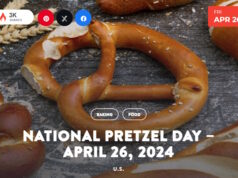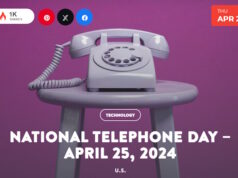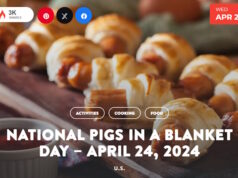
National Techies Day on October 3rd encourages students to consider a career in technology. With so many opportunities in the growing technology field, students seeking a career in technology will find promising choices anywhere they look.
- In 2012, the Engine Advocacy commissioned a report by the Bay Area Council Economic Institute in California. According to the report, for every high-tech job, four more jobs are created. That’s a lot of economic boost created by one industry.
- By 2030, the technology sector will continue to grow while other job sectors may decline. While the jobs future changes, one thing remains steady – technology.
- Healthcare technologies will continue growing by nearly 48 percent. While research ramps up, surgeons and medicine take advanced technologies to a whole new level. With it, they need software specialists trained to maintain the equipment and train the medical personnel.
- Beyond medical technology, manufacturing advances technology every day. When considering the future of the automotive world alone, specialized technology keeps up the demand for qualified professionals.
- Software development grows every day. However, if we examine technology’s impact on manufacturing, security, and global environmental solutions, we can’t expect to ignore our future needs. The students in the classroom will be the skilled, trained technology-savvy employees of tomorrow. We need them to be.
- Take note that National Techies Day falls during National Cyber Security Awareness Month. Techies ensure our devices are protected and secured. They develop the software and help us maintain our computers, smart devices, and more. If you don’t protect your computers – find a techie today!
- The average computer user blinks 7 times a minute, less than half of the normal rate of 20.
- The average child today knows how to use a mouse and play video games better than he or she can ride a bike or swim.
- 293.6 billion emails get sent and received every day in 2019. 97% of which are spam.
- There are more than 149,513 emails sent each minute.
- The average office worker receives about 121 emails daily
- Almost 76% of all US adults use email.
- 90% of users aged between 25 and 34 check their emails on a cell phone.
- Only 69% of users checked their emails via desktop/laptop last year.
- The first banner advertisement on a website was introduced in 1994.
- The average 21-year old has spent 5,000 hours playing video games, exchanged 250,000 e-mails, instant and text messages, and has spent 10,000 hours on a mobile phone.
- The name Google was an accident. A spelling mistake made by the original founders who thought they were going for Googol.
- The first computer mouse was introduced in 1968 by Douglas Engelbart at the Fall Joint Computer Expo in San Francisco. It was made from wood.
- More than one million domain names are registered every month. Up until 1994, domain names were free.
- Hewlett Packard, Google, Microsoft, and Apple were all started in garages.
- 28% of IT professionals hide their career from friends and family to get out of giving free tech support.
- PCs went by the name “Electronic Brains” in the 1950s.
- Email has been around longer than the World Wide Web.
- Bill Gates’ house was designed using a Mac computer.
- Technophobia is the fear of technology, Nomophobia is the fear of being without a mobile phone, Cyberphobia is the fear of computers.
- The original name of Windows was Interface Manager.
- The internet is 11893+ days old. For the exact amount of days, you can visit here.
- The QWERTY keyboard was designed to slow you down. If you want to type faster, try the Dvorak Keyboard.
- As of 2012, inside the original Macintosh case, you’ll find the 47 signatures, one from each member in the Macintosh division in the year 1982.
- During an average working day, the distance covered by the fingers of a typist is around 12.6 miles
- This number of devices connected to the internet is expected to increase to 125 billion by just 2030, which will put about 15 connected devices into the hands of every consumer. For consumers, these devices can include anything from light bulbs to coffee makers, headphones, TVs, security systems, wearables, self-driving cars, and plenty more.
- In the US, out of all the people getting married, approximately 20% met through online dating.
- The Firefox logo isn’t a fox. It is a red panda
- The first Apple logo isn’t what you would think. Originally, it featured Sir Isaac Newton sitting beneath a tree, with an apple about to fall on his head.
- Credit card chips have been around for a LONG time. Chip technology has been around since 1986! It was first used in France, followed shortly after by Germany.
- Mac computers were named after the apple. It’s not a coincidence that “Macintosh” is similar to the apples called “mcintosh”. The name was misspelled on purpose to avoid conflict with a manufacturer called “McIntosh Laboratory”.
- The first alarm clock could only ring at one time. The first mechanical alarm clock could only ring at 4 a.m. invented by Levi Hutchins in 1787. It wasn’t until 1876 that a wind-up alarm clock was made that could be set for any time.
- The first product scanned was a packet of chewing gum in 1974. Norman Joseph Woodland invented the barcode and received a patent in October 1952. It wasn’t until 22 years later when he was employed by IBM that the barcode was developed to be used for product labeling. Known as the Universal Product Code (UPC), a system that is still used today.
- 97% of people type in words to Google just to see if they spelled it right.
- The first word to ever be auto-corrected was “teh.” Back in the day, autocorrect wasn’t as efficient as it is now. In order to auto-correct “teh” to “the,” you had to press the left arrow and F3.
- There are over 35 billion Google searches each month. In May 2019, the top three most Googled words were “Facebook” at 233 million searches, “youtube” with 194 million searches, and “amazon” with 103 million searches.
- Over 6,000 new computer viruses are created and released every month. Today, 90% of emails contain some form of malware and most people don’t know about it.
- Out of all the 7.7 billion people in the world, over 6 billion have access to a cell phone. Meanwhile, only 4.5 billion have access to working toilets!
- 40% of American couples who got together in 2017 met online. Looking at a larger scale, meeting through friends declined by 13% from 1995 to 2017.
- 33% of divorced couples have stated Facebook was a reason for the break up. Some of these more specific reasons are things like inappropriate messages to other people, it causes couples to fight, secret social media accounts, and doubting the relationship.
- When typewriters were introduced, typing too fast would jam the keys. Using a QWERTY keyboard spaced out commonly used characters to slow typists down and prevent jamming.
- The world spends about 164 million hours every day streaming Netflix, which is equivalent to 18,812 years’ worth of TV and movies every 24 hours.
Sources:












